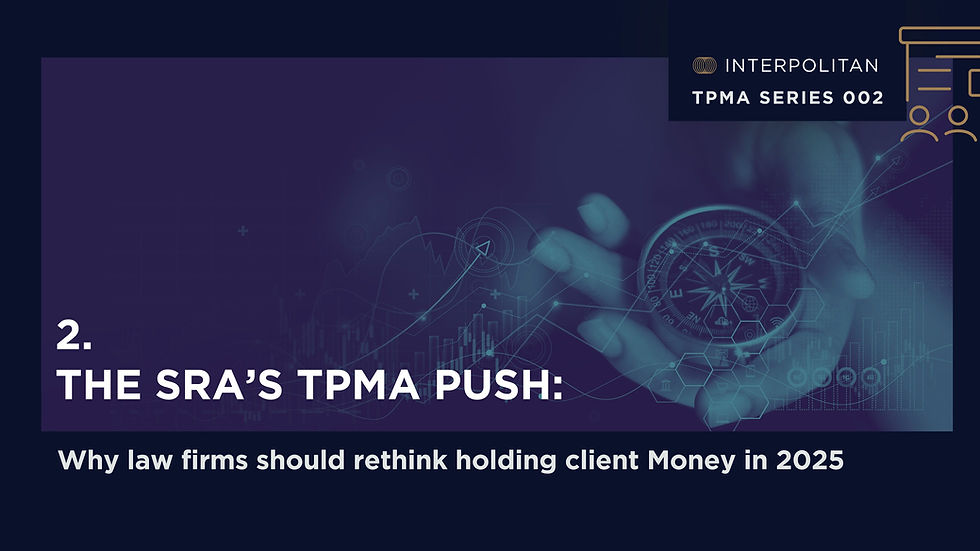TPMAs vs Traditional Client Accounts: A Cost–Benefit Analysis for Law Firms
- Jon East

- Aug 6, 2025
- 4 min read
Updated: Aug 7, 2025

Weigh the risks, costs, and compliance factors of using TPMAs vs traditional solicitor client accounts in 2025.
 Written by Jon East |  Contributor Daniel Dunne | Latest edited Aug 2025 5 min read. |
Table of contents
Welcome to the fifth instalment of our mini five part series on Third Party Managed Account.
Introduction
The traditional client account is no longer fit for purpose in today’s legal environment. While it once served as a reliable mechanism for managing client funds, increasing SRA scrutiny, cyber risk, and banking complexity have turned this once-routine practice into a source of operational friction and financial liability.
Now that FCA-regulated Third Party Managed Accounts (TPMAs) are formally recognised by the SRA, many firms are reassessing the true cost of managing client money themselves and exploring smarter, safer alternatives.
Hidden Costs of a Traditional Client Account
Traditional accounts don’t just come with admin. They come with a price:
SRA Compensation Fund: Mandatory levy contributions based on risk profile even for low-volume fund handling.
Professional Indemnity Insurance (PII): Premiums often inflated due to the presence of client money on the balance sheet.
Internal Oversight: COFA time, partner oversight, and ongoing reconciliation obligations eat into valuable billable hours.
Cyber Risk: Law firms are prime phishing targets and client accounts are a major vulnerability.
Banking Friction: Many banks are withdrawing or limiting client account services, forcing firms to jump through new compliance hoops.
Audit & Stress: Annual audits and SRA spot checks create avoidable risk and pressure.
"It’s not just the cost, it’s the operational drag. Law firms are increasingly asking: why are we holding client money at all? " — Daniel Dunne - Head of Legal Partnerships, Interpolitan
Cost Model of a TPMA
TPMAs shift the model from cost centre to service layer:
No float required — funds are held by the TPMA provider, not the firm.
Per-transaction pricing — scalable with your practice needs.
Reconciliation and reporting handled externally — freeing up internal resource.
No SRA Compensation Fund levy — because client money isn’t held.
Potential for lower PII — reduced liability means reduced risk profile.
Full FCA oversight — giving you and your clients peace of mind.
Side-by-Side Comparison Table
Feature | Traditional Client Account | TPMA |
Regulator | SRA | FCA |
Reconciliation | Daily (in-house) | Provider-managed |
Risk of Misuse | Solicitor-held funds | No access to funds |
Cyber Exposure | High | Low |
PII Impact | High | Often lower |
Compensation Fund | Mandatory | Not applicable |
Cost Structure | Fixed costs + risk premiums | Per transaction |
Client Experience | Reactive | Streamlined, transparent |
Use Cases: Where TPMAs Add Real Value
Litigation Pay-outs: Remove the burden of holding multi-party funds over long case durations.
Private Client Settlements: Probate and estate distributions are cleaner and faster with TPMA structures.
Residential & Commercial Property: Streamline completions while mitigating fraud and reconciliation risk.
Trusts & Foundations: When handling structures across jurisdictions, TPMAs offer an additional compliance layer.
International Deal Support: Cross-border payments and multiple currencies managed in one platform.
Real-World Case Studies: Misappropriation & Risk in Legal Client Accounts - Hutchings / Axiom Ince
TPMA vs Traditional Client Accounts: Cost–Benefit Analysis
£60+ million allegedly misused by Axiom Ince
What happened: Axiom Ince collapsed in 2023 after a director allegedly misused over £60 million in client funds. The scandal triggered mass regulatory fallout, compensation fund exposure, and a wider loss of trust in the legal sector.
Regulatory outcome: The SRA closed the firm, suspended practising certificates, and began ongoing investigations into directors. Clients and creditors were left facing extensive delays and shortfalls.
Relevance to TPMA: Demonstrates how the cost of managing client money internally—when things go wrong—isn’t just financial, it’s existential. TPMAs reduce this risk by removing solicitor access to funds and placing them under FCA-regulated control.
Source: Law Gazette
Risk, Reputation & Regulatory Readiness
The SRA’s stance is clear: the burden of managing client money is only going to increase. With the move toward proactive supervision, even firms with historically clean records are now facing higher compliance expectations.
And if you're still relying on a single in-house individual to manage reconciliation and payments, you may be exposing your firm to unnecessary operational risk.
TPMAs offer a way forward:
Transparent oversight
Segregated accounts
Named account structures
24/7 reporting visibility
Minimal setup friction
“We moved to a TPMA to remove friction in property deals. We ended up saving time, stress, and reducing PII costs in the process.” — Managing Partner, UK Law Firm (Anonymous)
Final Thoughts: Why This Matters Now
If you’re still managing a traditional client account, ask yourself:
Are we truly comfortable with the risk we’re holding?
How much time and resource are we allocating to managing money we don’t profit from?
What’s the opportunity cost of doing nothing?
With the SRA signalling stronger supervision, and more banks retreating from client money services, there’s never been a better time to explore a smarter alternative.
“TPMAs don’t just lower risk — they can lower cost too.”
“Why spend staff time managing money you don’t want to hold?” — Robin Bates - Assistant Vice President, Escrow, Interpolitan
Ready to Protect Your Clients and Your Firm?
Interpolitan provides fully aligned FCA-regulated TPMA services for legal professionals across the UK and internationally. We help mitigate risk, simplify compliance, and future-proof your operations.
Let us show you how a TPMA can de-risk your operations and free your team to focus on what they do best.
Next in our series:











Comments